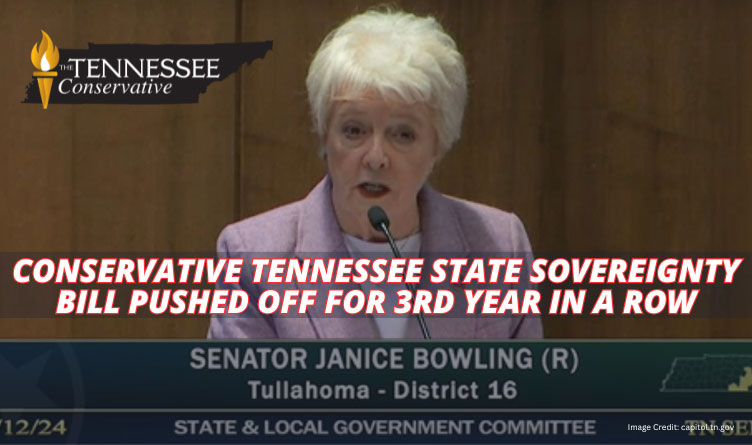Image: Bill Sponsor Senator Janice Bowling presents the legislation to the Senate State and Local Government Committee. Image Credit: capitol.tn.gov
The Tennessee Conservative [By Kelly M. Jackson] –
For the third year in a row, a conservative Tennessee bill, that would allow state legislators to impose nullification if the federal government tries to impose unconstitutional laws or regulations, has been scuttled.
The bill aims to create a process by which Tennessee could practice its right to question any imposed federal law/regulation found to be unconstitutional and effectively nullify it if deemed necessary.
After failing to pass in the Tennessee General Assembly in both 2022 and 2023, the “Restoring State Sovereignty Through Nullification Act” was officially introduced for the 2024 legislative session.
Sen. Janice Bowling (R-D16-Tullahoma) was not giving up on this legislation, and had reintroduced it this year under Senate Bill 2775 (SB2775).
The corresponding House Bill 2795 (HB2795) is being carried by Rep. Bud Hulsey (R-Kingsport-District 2).
Yesterday, March 12th, any hope of seeing the legislation make it to the floor of either chamber for discussion was killed when the Senate State and Local Government Committee deferred the bill to “Summer Study”.

The debate during the meeting was lively. The author of the legislation, Greenville Tennessee constitutional attorney Jeff Cobble, explained that the bill would not be giving the state a free pass to do whatever it wants. Rather, it would create an opportunity for state lawmakers to discuss and determine whether the federal government or the Governor would be usurping the power of the legislative branch of state government in an event such as those we have encountered in the past 4 years with COVID.
The Tennessee State Constitution and the U.S. Constitution both enumerate the powers to all branches of government. In his presentation of the bill, Mr. Cobble explained that while there are three branches of government, he opined that they are not necessarily equal, in that the legislature, as representative of the people, has maybe more power to check the other two branches of government when necessary.
During the discussion on the floor an issue was raised by Senator Adam Lowe (R-D1-Calhoun) when he asked whether the state of Colorado would have had the authority to keep President Donald Trump off the ballot, asking if they had a law in their state that would allow the state government to nullify the precedents used by the Supreme Court to determine their ruling.
Cobble responded that federal elections are enumerated in the Constitution as one of the items given to the federal government to manage.
Cobble said, “The question about what the states have the authority to nullify, is in the text of the Constitution.. states cannot nullify what was given to the federal government, but states can nullify when the federal government steps into the state and takes authority for things that were not delegated.”
Cobble provided contemporary examples where states have chosen to ignore the federal laws in some areas and adopt laws in their own states that apply differently, for example with marijuana and “real id’s”. States have pretty well passed their own laws and abided by those without taking the federal laws on those issues into account. This is because it isn’t an issue enumerated to the federal government specifically.

The federal government can pass a law, but unless it is an issue that is enumerated in the Constitution as one belonging to the federal government, the states inherently have ability and the power to create laws within the states that according to their citizens, are those by which they choose to abide.
Before the bill was even brought before the committee for discussion, Attorney General Jonathan Skrmetti’s office issued an opinion that concluded state legislatures do not have the authority to determine whether or not a law has the ability to bear constitutional scrutiny, but rather that ability was solely given to the judiciary who would then make that determination.
In other words, it isn’t the original text of the Constitution that would be consulted for direction on pieces of legislation, but rather case precedent and the judiciary would be the standard by which the case and possibly a new application of a law would be determined.
According to Mr. Cobble and other critics of the opinion, there is no such case to be made within the state or federal constitutions that draw any such conclusion.
Gary Humble, Executive Director of Tennessee Stands, argues that the opinion is tantamount to judicial supremacy, and that a reliance on case law rather than the original text of The Constitution will culminate in bad precedent, as such was the case in Roe.
Humble said:
“It cannot be overstated that in 2021 during the case to overturn Roe v Wade (1973), the Court acknowledged out loud what so many of us have always known to be true…the Courts act on an illegitimate supreme authority that it has given itself...
By depending on bad case law instead of the original text of the constitution itself, our Attorney General is doing the same thing here. He reasons from Tennessee case law such as Richardson, 913 S. W. 2d 446 (1995) and City of Memphis, 146 S. W. 3d 531 that “the power to determine the constitutionality of a law [is a] ‘function reserved for the judicial branch.’” The problem is that it is found nowhere in the text of Article VI or anywhere else in our state constitution where this power is expressly given to the judicial branch. In fact, you will find quite the opposite.”
Humble also points out that our legislators take an oath to uphold The Constitution.
He reasoned, “ It is hard to comprehend how a governor or a legislator, a representative of the people, is able to fulfill this oath without having the ability to reason within themselves to interpret a constitution that they have sworn to uphold.”

The bill was sent to Summer Study with an unusual voice vote being taken (The State Senate utilizes a roll call vote in all their committee processes with regularity) with all committee members voting in favor, except for four.
Republican Senators Page Walley, Ken Yager and Mark Pody voted “No” alongside Democrat Jeff Yarbro.
Senator Page Wally pointedly raised his objection, explaining that he felt the issue was one of enough importance that needed to be dealt with in the moment, and was prepared to do so.
Due to the bill being effectively killed in the Senate, its companion in the House was taken off notice and will not go through the committee process this year.
Sources tell The Tennessee Conservative that had the bill gone to a vote rather than being sent to summer study, there would have been enough support (votes from the committee) to push it onto full committee, and one step closer to a floor vote.
Senator Bowling has vowed to revive the bill again next session for a fourth year in a row.


About the Author: Kelly Jackson is a recent escapee from corporate America, and a California refugee to Tennessee. Christ follower, Wife and Mom of three amazing teenagers. She has a BA in Comm from Point Loma Nazarene University, and has a background in law enforcement and human resources. Since the summer of 2020, she has spent any and all free time in the trenches with local grassroots orgs, including Mom’s for Liberty Williamson County and Tennessee Stands as a core member. Outspoken advocate for parents rights, medical freedom, and individual liberty. Kelly can be reached at kelly@tennesseeconservativenews.com.



7 Responses
As usual our Tn legislature leadership abandines their elected responsibilities.
APPALLING
*
Kelly, Thank You
Daniel Horowitz advocates effectively, accurately & persuasively for our State Sovereignty bill.
Who is Sovereign in America, WTP who created our government or temporary occupants of the offices we created?
https://podcasts.apple.com/us/podcast/why-states-interpreting-the-constitution-is-the-hill/id1065050908?i=1000648794999&utm_source=substack&utm_medium=email
Once again, TN “Republicans” prove themselves to be nothing but a collection of gutless, treasonous cucks, or far left anti American pedophiles.
RINOs kill another good bill.
Hope y’all will post all the harm they’ve did whenever they’re primaried.
I’ll never support TNGOP till they stop letting RINOs run.
The Tennessee AG is an unelected bureaucrat (same as our state Supreme court). In our current case, Lockdown Lee’s selected attorney.
I can’t blame Skrmetti for thinking the TNGOP incapable of determining constitutionality, because they are so bad at it. Case in point, Lockdown Lee’s fake “constitutional carry” law – beat down immediately on 2nd and 4th Amendment grounds – with zero consequences for the TNGOP civil rights violators under color of law. The TNGOP is no better than French Laundry Newsome with the “one gun a month” law. Just force blatant unconstitutional bills, via the executive branch (also unconstitutional, violation of separation of powers in branches of government) and then force the people to grovel at the judicial branch (that the executive selects) to get it overturned. “Laws” repugnant to the constitution are null and void. We don’t need judges with direct financial conflict of interest to their selectors to rule on such things.
The preamble of the U.S. Constitution begins with “We the People”….not We the Supreme Court Justices. I’m curious how Skrmetti opines Article 1 Section 1 of the Tennessee Constitution…
Mark Pody did not vote “no” as this article states. He is the one who suggested moving it to summer study.